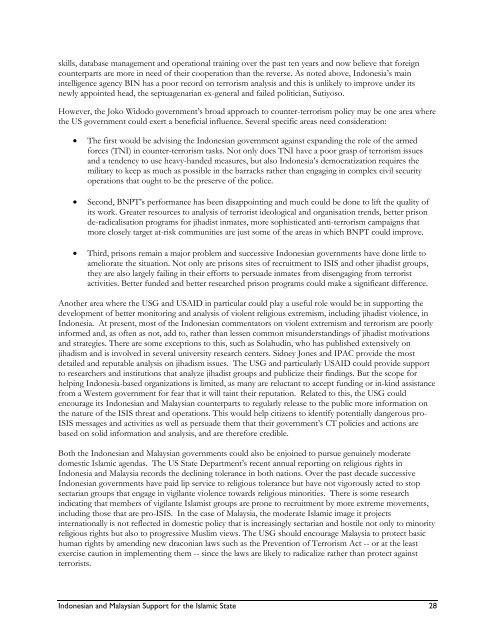INDONESIAN AND MALAYSIAN SUPPORT FOR THE ISLAMIC STATE (FINAL REPORT)
CVE_IndonesianMalaysianSupportforISIS
CVE_IndonesianMalaysianSupportforISIS
Create successful ePaper yourself
Turn your PDF publications into a flip-book with our unique Google optimized e-Paper software.
skills, database management and operational training over the past ten years and now believe that foreign<br />
counterparts are more in need of their cooperation than the reverse. As noted above, Indonesia’s main<br />
intelligence agency BIN has a poor record on terrorism analysis and this is unlikely to improve under its<br />
newly appointed head, the septuagenarian ex-general and failed politician, Sutiyoso.<br />
However, the Joko Widodo government’s broad approach to counter-terrorism policy may be one area where<br />
the US government could exert a beneficial influence. Several specific areas need consideration:<br />
<br />
<br />
<br />
The first would be advising the Indonesian government against expanding the role of the armed<br />
forces (TNI) in counter-terrorism tasks. Not only does TNI have a poor grasp of terrorism issues<br />
and a tendency to use heavy-handed measures, but also Indonesia’s democratization requires the<br />
military to keep as much as possible in the barracks rather than engaging in complex civil security<br />
operations that ought to be the preserve of the police.<br />
Second, BNPT’s performance has been disappointing and much could be done to lift the quality of<br />
its work. Greater resources to analysis of terrorist ideological and organisation trends, better prison<br />
de-radicalisation programs for jihadist inmates, more sophisticated anti-terrorism campaigns that<br />
more closely target at-risk communities are just some of the areas in which BNPT could improve.<br />
Third, prisons remain a major problem and successive Indonesian governments have done little to<br />
ameliorate the situation. Not only are prisons sites of recruitment to ISIS and other jihadist groups,<br />
they are also largely failing in their efforts to persuade inmates from disengaging from terrorist<br />
activities. Better funded and better researched prison programs could make a significant difference.<br />
Another area where the USG and USAID in particular could play a useful role would be in supporting the<br />
development of better monitoring and analysis of violent religious extremism, including jihadist violence, in<br />
Indonesia. At present, most of the Indonesian commentators on violent extremism and terrorism are poorly<br />
informed and, as often as not, add to, rather than lessen common misunderstandings of jihadist motivations<br />
and strategies. There are some exceptions to this, such as Solahudin, who has published extensively on<br />
jihadism and is involved in several university research centers. Sidney Jones and IPAC provide the most<br />
detailed and reputable analysis on jihadism issues. The USG and particularly USAID could provide support<br />
to researchers and institutions that analyze jihadist groups and publicize their findings. But the scope for<br />
helping Indonesia-based organizations is limited, as many are reluctant to accept funding or in-kind assistance<br />
from a Western government for fear that it will taint their reputation. Related to this, the USG could<br />
encourage its Indonesian and Malaysian counterparts to regularly release to the public more information on<br />
the nature of the ISIS threat and operations. This would help citizens to identify potentially dangerous pro-<br />
ISIS messages and activities as well as persuade them that their government’s CT policies and actions are<br />
based on solid information and analysis, and are therefore credible.<br />
Both the Indonesian and Malaysian governments could also be enjoined to pursue genuinely moderate<br />
domestic Islamic agendas. The US State Department’s recent annual reporting on religious rights in<br />
Indonesia and Malaysia records the declining tolerance in both nations. Over the past decade successive<br />
Indonesian governments have paid lip service to religious tolerance but have not vigorously acted to stop<br />
sectarian groups that engage in vigilante violence towards religious minorities. There is some research<br />
indicating that members of vigilante Islamist groups are prone to recruitment by more extreme movements,<br />
including those that are pro-ISIS. In the case of Malaysia, the moderate Islamic image it projects<br />
internationally is not reflected in domestic policy that is increasingly sectarian and hostile not only to minority<br />
religious rights but also to progressive Muslim views. The USG should encourage Malaysia to protect basic<br />
human rights by amending new draconian laws such as the Prevention of Terrorism Act -- or at the least<br />
exercise caution in implementing them -- since the laws are likely to radicalize rather than protect against<br />
terrorists.<br />
Indonesian and Malaysian Support for the Islamic State 28


